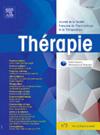Monitoring misuse and abuse of psychoactive substances in France: Insights from substance abuse treatment facilities through the OPPIDUM program
IF 1.8
4区 医学
Q3 PHARMACOLOGY & PHARMACY
引用次数: 0
Abstract
The OPPIDUM program was first created in 1990. It is an annual, repeated, cross-sectional, nationwide, multicenter program. Data are provided directly from users of psychoactive substances (PAS) seen in substance abuse treatment facilities. The OPPIDUM program includes sociodemographic data, data on the first PAS used and leading to dependence, data on PAS use in the week prior the interview and the modality of use. The OPPIDUM program contributes to characterize patterns of SPA use and detect changes in modalities of use or/and in users profiles. It relies on the acceptability and adhesion of the growing number of participating substance abuse treatment facilities for more than 30 years, giving informative data at the national and regional level. In 2023, the OPPIDUM program gathers data from about 117,822 participants describing 239,959 patterns of PAS use (with more than 5000 participants each year). In this article, we reviewed the success of the oldest program of the French Addictovigilance Network (history, development, evolution and contribution) for the assessment and surveillance of substance abuse.
监测法国精神活性物质的误用和滥用情况:通过 OPPIDUM 计划从药物滥用治疗机构获得的启示。
OPPIDUM 计划始于 1990 年。这是一项每年重复进行的横断面全国性多中心计划。数据由在药物滥用治疗机构就诊的精神活性物质(PAS)使用者直接提供。OPPIDUM 计划包括社会人口学数据、首次使用精神活性物质并导致依赖的数据、访谈前一周使用精神活性物质的数据以及使用方式。OPPIDUM 程序有助于确定 SPA 使用模式的特征,并检测使用方式或/和使用者概况的变化。30 多年来,参与该计划的药物滥用治疗机构数量不断增加,其可接受性和依从性为该计划提供了国家和地区层面的翔实数据。2023 年,OPPIDUM 计划将收集来自约 117822 名参与者的数据,描述 239959 种 PAS 使用模式(每年参与者超过 5000 人)。在这篇文章中,我们回顾了法国瘾君子警戒网络(French Addictovigilance Network)历史最悠久的药物滥用评估和监测计划的成功之处(历史、发展、演变和贡献)。
本文章由计算机程序翻译,如有差异,请以英文原文为准。
求助全文
约1分钟内获得全文
求助全文
来源期刊

Therapie
医学-药学
CiteScore
3.50
自引率
7.70%
发文量
132
审稿时长
57 days
期刊介绍:
Thérapie is a peer-reviewed journal devoted to Clinical Pharmacology, Therapeutics, Pharmacokinetics, Pharmacovigilance, Addictovigilance, Social Pharmacology, Pharmacoepidemiology, Pharmacoeconomics and Evidence-Based-Medicine. Thérapie publishes in French or in English original articles, general reviews, letters to the editor reporting original findings, correspondence relating to articles or letters published in the Journal, short articles, editorials on up-to-date topics, Pharmacovigilance or Addictovigilance reports that follow the French "guidelines" concerning good practice in pharmacovigilance publications. The journal also publishes thematic issues on topical subject.
The journal is indexed in the main international data bases and notably in: Biosis Previews/Biological Abstracts, Embase/Excerpta Medica, Medline/Index Medicus, Science Citation Index.
 求助内容:
求助内容: 应助结果提醒方式:
应助结果提醒方式:


